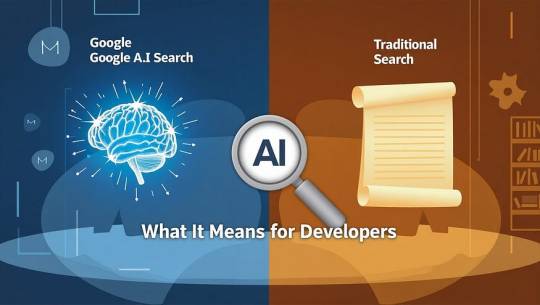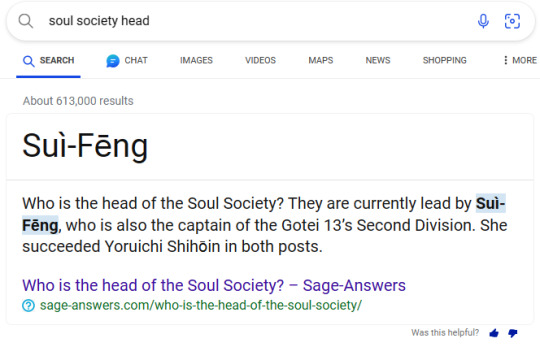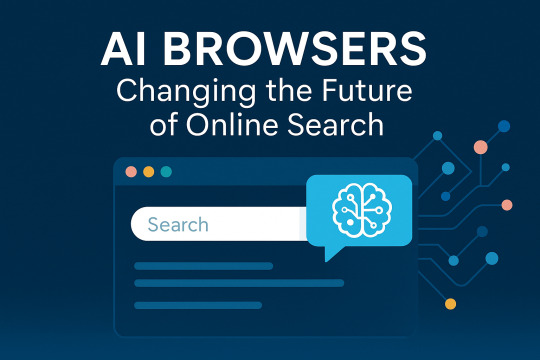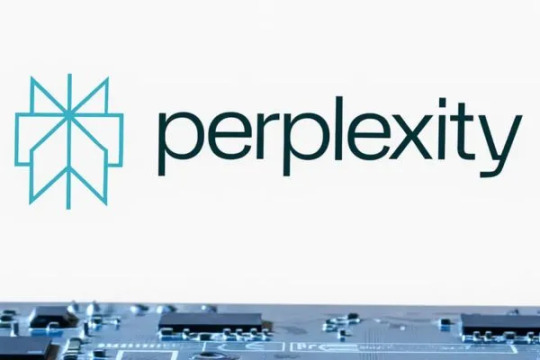#AI-powered searches
Explore tagged Tumblr posts
Text
Google AI Search vs Traditional Search: What It Means for Developers

The way we search for information online is no longer what it used to be. Gone are the days when typing a few keywords into a search bar simply brought up a list of links. Today, we’re entering a new era — one where artificial intelligence is reshaping how search engines understand, process, and respond to our queries.
At the forefront of this transformation is Google AI Search — a powerful evolution that’s making search more conversational, contextual, and intuitive. It’s not just about retrieving results anymore; it’s about delivering meaningful answers, summaries, and insights in real time.
So how does this new AI-powered approach compare to the traditional search methods we’ve relied on for decades? And what does this rapid shift mean for developers, especially those working in web development and digital product spaces?
To truly grasp the implications, we need to explore how Google AI Search works, how it’s redefining the developer’s role, and what steps professionals can take to stay relevant in this fast-moving digital age.
In this blog, we’ll break down the core differences between Google AI Search and traditional search methods, explore how these changes are shaping the future of development, and share practical steps that businesses and developers can take to stay ahead in this fast-moving, AI-driven era.
What Is Google AI Search?
Google AI Search refers to the enhanced search experience powered by artificial intelligence, including technologies like machine learning, natural language processing (NLP), and generative AI. This new generation of search doesn’t just retrieve links — it understands context, summarizes information, and often provides direct answers instead of merely listing web pages.
At the core of this evolution is Google’s Search Generative Experience (SGE). Launched as part of Google’s experimentation with generative AI, SGE is designed to offer smarter, more conversational, and nuanced responses to user queries.
Instead of relying purely on keyword matching, Google AI Search evaluates intent, understands the relationship between concepts, and delivers responses tailored to the user’s query with near-human reasoning.
How Is Traditional Search Different?
Traditional search — the one most users have grown up with — works on a relatively straightforward model. It scans through indexed pages based on keyword relevance, page ranking, backlinks, and a variety of search engine optimization (SEO) signals. The results are typically ten blue links pointing to pages Google thinks best match your query.
This model has served the digital world well for decades. It was predictable, link-focused, and offered opportunities for businesses and developers to optimize content for visibility through on-page and technical SEO.
However, traditional search is limited in how it handles context, ambiguity, or complex queries. It leans heavily on how a question is phrased, often requiring users to refine their queries or dig through multiple links to find an answer.
What Makes Google AI Search More Powerful?
The most striking difference is that AI-powered search aims to deliver answers, not just sources. Here’s how:
Contextual Understanding: AI interprets the user’s query more like a human would. For example, if someone searches “best framework for scalable web app in 2025,” AI can analyze current trends, compare multiple frameworks, and offer a summary — not just links.
Personalization: Google AI is capable of tailoring responses based on a user’s preferences, past search behavior, and geographical location. This means developers must start thinking beyond one-size-fits-all content.
Interactive Answers: The AI-powered interface allows users to ask follow-up questions within the same conversation. It mimics a chatbot-like experience where users drill deeper into a topic.
Fewer Clicks, More Insights: Since many answers are given right in the search results (often called “zero-click searches”), developers must work smarter to earn visibility and engagement through structured content and schema markup.
Why Should Developers Pay Attention to This Shift?
For web developers and content creators, this change is more than just cosmetic. It influences how websites should be designed, developed, and optimized. Here’s what developers need to keep in mind:
1. Structured Data Is More Important Than Ever
With AI pulling answers directly into the search results, the use of structured data (schema markup) becomes crucial. Developers must ensure that their websites provide information in a format that search engines can easily interpret and repurpose.
2. Voice and Conversational Queries Are Rising
AI Search aligns closely with how people speak, not how they type. Developers must now account for natural language queries, meaning content should be more conversational, and metadata should reflect how users actually phrase questions.
3. Content Quality Beats Quantity
In the age of AI search, quality and relevance trump keyword stuffing. Developers collaborating with content teams should prioritize user intent, ensuring that answers are accurate, concise, and well-structured.
4. Performance Still Matters
Even with AI summarizing information, the user may still visit a site to dive deeper. A fast-loading, mobile-optimized, and accessible website remains critical. Web developers should continue optimizing Core Web Vitals and overall user experience.
What New Opportunities Does Google AI Search Create?
While the idea of users not clicking through to websites may seem alarming, AI search introduces new avenues for visibility and innovation.
Smarter Featured Snippets
AI often uses content from top-ranking pages to generate summaries. Developers can aim for rich snippet eligibility by formatting content using bullet points, subheadings, and answering FAQs directly.
AI-Ready Applications
Developers can also begin building AI-integrated search experiences into their own platforms using tools like Google Cloud’s Vertex AI, enabling smarter internal search functions on websites and apps.
Relevance of Web Development Services
This shift means businesses will rely more on professional web development services to stay competitive. Developers need to future-proof websites by aligning with Google’s AI-driven search principles and technologies.
How Should Developers Adapt Their SEO Strategies?
Developers working alongside SEO professionals must rethink their approach. Here’s how:
Focus on Entity-Based SEO: Rather than chasing keywords, align your content and structure around entities and concepts Google understands.
Use AI Tools for SEO Optimization: AI-driven SEO tools can now help developers analyze gaps, suggest content improvements, and optimize metadata for natural language queries.
Enhance UX and Semantic HTML: Using semantic tags like , , helps AI interpret content better. A solid UI/UX design aids navigation and improves time on site.
What Are the Challenges of AI Search for Developers?
Like any disruptive technology, AI Search introduces a few development and content-related challenges:
Reduced Organic Traffic: With answers shown directly in results, there may be fewer site visits. Developers must design landing pages that immediately capture interest when users do click.
Increased Competition: Everyone wants to be the source the AI chooses. This leads to a higher bar for content quality and code structure.
Complex Query Optimization: Long-tail conversational queries become important. Developers should help content teams structure answers that AI can parse cleanly.
How Can CodeRower Help You Navigate This Change?
CodeRower, a modern software development company, is already aligning its services with the future of AI-driven digital experiences. With a sharp focus on web development, CodeRower empowers businesses to create AI-optimized websites that are not only visually appealing but also perform exceptionally well in both traditional and AI-enhanced search engines.
Their team combines technical expertise with a deep understanding of how AI search impacts user behavior and digital strategy. From implementing semantic HTML to integrating structured data and optimizing performance, CodeRower helps businesses stay visible, relevant, and competitive in the age of intelligent search.
If you’re a business owner or developer unsure of how to adapt to Google’s AI-driven landscape, CodeRower provides the support and strategy to future-proof your digital presence.
Is This the End of Traditional Search?
Not quite. Traditional search still powers a significant portion of the web, and many users prefer exploring multiple sources rather than relying on a single AI-generated summary. That said, AI search is no longer a niche feature — it’s becoming the default experience across platforms.
Developers must view traditional and AI search not as rivals, but as complementary forces. The goal should be to build robust, flexible websites that cater to both.
What’s Next for Developers?
With the AI revolution in full swing, developers are expected to:
Embrace continuous learning in AI, NLP, and data structures.
Work closely with SEO teams to build AI-friendly content structures.
Integrate AI tools and APIs into both backend and frontend applications.
Stay agile and open to experimental search behaviors and UX trends.
Final Thoughts: How Can Developers Win in the AI Search Era?
The key is to understand user intent, focus on clarity, deliver value, and ensure your website is structured in a way that both humans and AI can understand. Developers are now at the frontlines of content discoverability, playing a bigger role than ever before in how users find and consume information.
Google AI Search is not the end of development as we know it — it’s the beginning of a more intelligent, adaptive, and user-focused digital age.
Frequently Asked Questions (FAQs)
1. What is the main difference between Google AI Search and traditional search? Google AI Search uses artificial intelligence to understand context and deliver direct answers, while traditional search relies on keyword matching and link-based results.
2. How does AI search affect SEO strategies? AI search shifts the focus from keyword density to content quality, context, and structured data, requiring smarter content and semantic markup.
3. Should developers worry about zero-click results with AI Search? Yes, developers need to optimize content for rich snippets and structured formats to stay visible even when users don’t click through.
4. How can developers prepare for AI-powered searches? By implementing schema markup, improving website performance, using semantic HTML, and aligning content with user intent.
5. Is traditional SEO still relevant to Google AI Search? Absolutely. Traditional SEO fundamentals still matter, but they need to be enhanced with AI-aware practices for maximum visibility.
#Google AI#Google AI search#Google AI Search vs Traditional Search#AI-powered searches#web development#software development#software development company
0 notes
Text
i do think that many of you are much more distrustful and contemptuous of ai than is reasonable
#also the 'using ai kills the planet' thing is a bit of a misnomer#TRAINING the ai can take large amounts of power#querying the ai as a consumer takes about as much energy as a google search#ai art might be ugly but its not like every image is killing a tree
40 notes
·
View notes
Text
*Back when I hecking do not know who shipping works but did it with my gut and brains*
Past me in 2022/2023(I think-):"AAHHHHHHH- WHICH SHIP- THEIR BOTH SO CUTE AND REALLY GOOD TOGETHER-"
...
"Oh!!I see!Oh I am a multishipper,cool. I could just make videos of one ship and do the other in the next when I want to."
The fact I was fine, and just based of others with their ships. I just said "Okay,so this is fine cause it's a au.Got it."
Yeah,you know this tumblr acc kinda started off with lots of tsbs(More focussingly on tsams/laes/eaps)
Which was a fandom I did and so continue. Transformers than got my attention for real cause of rescue bots when my brothers were watching season 3 when we see the two old new bots(No spoilers).
I loved the gacha community since it was fun!And tf gacha was pretty easy for me to make and have my joy in my passions.
Idk why I wanted to share this, I kinda just went with it.
Also, it was my comfort, and still is(My fandoms are the best:3 ).
#lednet au talks!#I was a big optiratch shipper but I also enjoy wheelchet#Man must of carry on in the tsams fandom with me-#speaks of *cough* Solnex and Soluin-#And maybe vicgent and vicsi- *OOF*#Shhhh....The power of this force will be unstoppable to be restrained further....#transformer#maccadams#tsbs#the security breach show#alan becker#ava#avm#av#And then I me back then knowing no shit of the whole “LGBTQ” but shipped one mech and an other mech and made them kiss or someth#I WAS SO GODDAMN LUCKY ONE TIME I KNEW IT- I KEEP ASKING QUESTIONS ALOT WHEN I DON'T KNOW AND GET SHAMED FOR NOT KNOWING THE TOPIC-#I am under a rock chat like- so down deep in the void-#NOT TSAMS VOID BHCR BDWJBF#yaps in tags is the best#then other shit I didn't know like neurodivergent/ other disablites mentally/physically much#Then I became interested and went on dammed resreach searching alot (So lucky that ai wasn't there before now) cause holy moly it sounded#kinda cool in a way/ hey I like this subject and want to learn more#Oh my I realize when I was comforting alot of people and began to realize more situations I never knew happens around me every second-#long tags#I honestly did what I could do and yeah#no this isn't a vent-#idk should I keep this?#I'm silly but stupid in oh I lost my fucking bag at a libary with all my important stuff-#SSSSSSSSIIIIIIIIIIIIIIIGGGGGGGGGHHHHHHHHHHH-#Oh and I yesterday I made a poem with my class since we were subjected to do so and I choose depression :D
5 notes
·
View notes
Text
youtube
#digital marketing#@desmondjohnson183#marketing strategy#DeepSeek AI#digital marketing AI#open-source AI#AI in marketing#AI-driven content creation#predictive marketing#AI chatbots#AI-powered advertising#voice search optimization#influencer marketing AI#ethical AI#data analytics#AI customer engagement#AI-powered SEO#future of digital marketing.#Youtube
3 notes
·
View notes
Text
#onlinemarketing#onlinemarketingtips#@desmondjohnson183#DeepSeek AI#digital marketing AI#open-source AI#AI in marketing#AI-driven content creation#predictive marketing#AI chatbots#AI-powered advertising#voice search optimization#influencer marketing AI
3 notes
·
View notes
Text

congrats to Sui Feng on her promotion.
#went to look up yamamoto's full name bc i can never remember how to spell it#and this is what came up#very important lesson on not trusting the first thing that pops up after searching#but also very funny. like where did you get this information ai-powered search algorithm#the fact that this implies yoruichi was the leader of soul society at some point...#i'd love to see what sort of unparalleled chaos that would create lmao#bleach#sui feng#yoruichi shihouin#sage speaketh#queued up
10 notes
·
View notes
Text
Artificial Intelligence [AI] in 2025: Jobs, Tools, Automation & Career Ultimate Article
What is Artificial Intelligence (AI)? Definition and Concept Artificial Intelligence (AI) refers to the development of computer systems that can perform tasks typically requiring human intelligence, such as learning, problem-solving, reasoning, perception, and language understanding. These systems use algorithms and data to make decisions, often without human intervention, enabling them to…
#AI automation tools#AI career opportunities#AI in business automation#AI in the workplace 2025#AI job market trends#AI job roles and salaries#AI jobs 2025#AI revolution 2025#ai tools#AI tools for productivity#ai websites#AI-powered job search tools#artificial intelligence#Artificial intelligence career guide#Best AI tools 2025#chat gpt#chatgpt#chatgpt prompts for productivity#Future of AI jobs#google bard ai website#Machine learning jobs 2025#Top AI certifications 2025#top artificial intelligence companies in india listed on nse
1 note
·
View note
Text
Create Impactful Digital Experiences with Augmented Reality Development Services
At Atcuality, we believe in the power of augmented reality to transform how users interact with brands. Our augmented reality development services provide businesses with innovative solutions that captivate audiences by blending digital and real-world elements. This immersive technology enables users to visualize products, explore environments, and experience services in a whole new way. Our experienced team of developers and designers work collaboratively with clients to deliver custom AR applications that align with specific business goals. By adopting AR, businesses can enhance customer engagement, increase interaction, and differentiate themselves in a crowded market. With Atcuality’s augmented reality development services, you can create digital experiences that leave a lasting impression, building stronger connections with your audience. Discover how AR can benefit your brand and redefine customer interaction with Atcuality's expertise at your service.
#iot applications#artificial intelligence#technology#digital marketing#seo marketing#seo#seo services#emailmarketing#search engine optimization#google ads#socialmediamarketing#augmented reality#augmented human c4 621#augmented and virtual reality market#blockchain#ai powered application#amazon web services#mobile app development company#mobile app developers#mobile application development#app developers#app development company#azure cloud services#cash collection application#cloud security services#iot app development services#task management solution
4 notes
·
View notes
Text
Google AI : ಗೂಗಲ್ನಿಂದ ಕ್ರಾಂತಿಕಾರಿ AI ಫೀಚರ್ಸ್: ಗಂಟೆಗಟ್ಟಲೆ ಹುಡುಕಾಟಕ್ಕೆ ಇನ್ನು ತೆರೆ...!
Google AI – ನೀವು ಯಾವುದಾದರೂ ಮಾಹಿತಿ ಹುಡುಕಲು ಗೂಗಲ್ನಲ್ಲಿ ಗಂಟೆಗಟ್ಟಲೆ ಸಮಯ ಕಳೆಯುತ್ತಿದ್ದೀರಾ? ಹತ್ತಾರು ಲಿಂಕ್ಗಳನ್ನು ತೆರೆದು, ನಿಮಗೆ ಬೇಕಾದ್ದನ್ನು ಕಂಡುಕೊಳ್ಳಲು ಕಷ್ಟಪಡುತ್ತಿದ್ದೀರಾ? ಹಾಗಾದರೆ, ನಿಮಗೆ ಸಿಹಿ ಸುದ್ದಿ ಇದೆ! ಗೂಗಲ್ ಈಗ ತನ್ನ ಆರ್ಟಿಫಿಶಿಯಲ್ ಇಂಟೆಲಿಜೆನ್ಸ್ (AI) ವೈಶಿಷ್ಟ್ಯಗಳನ್ನು ಮತ್ತಷ್ಟು ಸರಳಗೊಳಿಸಿದ್ದು, ನಿಮ್ಮ ಹುಡುಕಾಟದ ವಿಧಾನವನ್ನೇ ಬದಲಾಯಿಸಲು ಸಿದ್ಧವಾಗಿದೆ. ಸಾಮಾನ್ಯ ಬಳಕೆದಾರರೂ ಸಹ AI ಶಕ್ತಿಯನ್ನು ಸುಲಭವಾಗಿ ಬಳಸುವಂತೆ ಮಾಡುವ…
#AI in daily life#AI search update#AI shortcuts#AI-powered search#deep search#Gemini#Google AI#Google AI 2025#Google AI features#Google updates#time-saving search
0 notes
Text
AI-Powered Content Creation: Redefining Strategies for Voice Search and Multimodal Experiences

In the fast-evolving digital landscape, content strategies are no longer confined to text and static visuals. Today, AI-powered content creation is transforming how brands communicate with their audiences. With technologies like voice search and multimodal AI becoming mainstream, businesses must rethink their approach to stay relevant and competitive.
This blog explores how AI-driven content creation is shaping the future of digital marketing and why embracing these innovations is crucial for businesses looking to grow in 2025 and beyond.
The Rise of AI-Powered Content Creation
Artificial Intelligence has changed the way content is ideated, produced, and distributed. From generating blog posts and videos to designing infographics and even audio, AI tools are enabling brands to produce high-quality content at scale.
For marketers, this means faster turnaround times, data-driven insights for personalization, and the ability to create hyper-relevant content for multiple platforms. Tools like ChatGPT, DALL·E, and others are paving the way for seamless AI-driven content creation.
Voice Search: A Game-Changer for Content Strategy
With smart assistants like Alexa, Siri, and Google Assistant becoming household staples, voice search is no longer a futuristic trend—it’s here.
Over 50% of all online searches are now voice-based. This shift requires content creators to optimize for conversational queries, long-tail keywords, and natural language processing (NLP). AI tools can analyze voice search patterns and help brands craft content that aligns with user intent.
For example:
Creating FAQ-rich content that answers common voice queries
Using AI to predict trending voice search topics in your niche
Crafting audio-friendly content for smart speakers and podcasts
Multimodal AI: Combining Voice, Vision, and Text
The future of content lies in multimodal AI—systems that can understand and generate text, images, audio, and video simultaneously. This opens new possibilities for brands to create immersive and interactive content experiences.
Imagine a product guide that includes written text, interactive visuals, and AI-generated voice instructions—all personalized for individual users. This is no longer a dream but a reality with AI technologies evolving rapidly.
Multimodal AI allows marketers to: ✅ Deliver cohesive messaging across multiple formats ✅ Create engaging campaigns for diverse audiences ✅ Enhance accessibility with voice and visual alternatives
Why Brands Must Adapt
Adopting AI-powered content creation isn’t just about keeping up with trends—it’s about survival in a digital-first world. Consumers expect personalized, interactive, and frictionless experiences across channels.
Brands leveraging AI can:
Save time and resources on content production
Gain insights from large data sets for smarter decisions
Scale their content marketing efforts globally
Those who don’t adapt risk falling behind competitors who are already using AI-driven content creation to dominate their markets.
Future-Proof Your Content Strategy
As businesses prepare for 2025 and beyond, integrating AI and optimizing for voice search should be top priorities. The shift to multimodal experiences will require brands to innovate their content strategies continuously.
Companies like Digital Rhetoric are leading the way in helping businesses embrace these technologies and create cutting-edge content strategies.
Final Thoughts
The digital landscape is evolving, and so must your content strategy. By leveraging AI-powered content creation, optimizing for voice search, and adopting multimodal AI, brands can engage audiences more effectively and future-proof their marketing efforts.
0 notes
Text
AI Max & PPC Excellence | PPC Management Services in Toronto

Smarter campaigns start here. Google’s new AI Max campaign is transforming paid search by using real-time data and automation for better performance. Discover the power of AI Max Goog Ads in ppc for businesses looking to scale faster and convert smarter.
🚀 Real-time search query analysis 🤖 Machine learning drives smarter ads 📊 Conversion tracking for precision 🎯 Focused on high-intent keywords
Looking for expert ppc management services in Toronto? Pat’s Marketing helps you harness AI Max for smarter, faster results.
#ppc management services in Toronto#AI-powered PPC#Google Ads Toronto#paid search optimization#digital advertising Toronto
0 notes
Text
#digital marketing#onlinemarketingtips#seo services#DeepSeek AI#digital marketing AI#open-source AI#AI in marketing#AI-driven content creation#predictive marketing#AI chatbots#AI-powered advertising#voice search optimization#influencer marketing AI#ethical AI#data analytics#AI customer engagement
3 notes
·
View notes
Text
AI Browsers: The Future of Online Search

For over two decades, web browsers like Google Chrome, Microsoft Edge, Safari, and Firefox have shaped the way we explore the internet. They have become an everyday tool, just like books once were for libraries. But now, something entirely new is emerging—a new type of browser that doesn’t just let you search but helps you think, decide, and act. These are AI browsers, and they might soon change the way we use the internet completely.
#AI browsers#Future of online search#Perplexity Comet browser#AI-powered browsing#Search engine innovation#Intelligent web assistant
0 notes
Text
Perplexity Launches Comet: An AI-Powered Web Browser for the Future of the Internet
Perplexity AI is entering a bold new chapter in AI innovation with the launch of its latest product: Comet, an artificial intelligence-powered web browser. Designed to redefine how users interact with the internet, Comet combines AI-powered search with enterprise integration and advanced conversational features — and it’s available now to select Perplexity Max subscribers.

“built Comet to let the internet do what it has been begging to do: to amplify our intelligence.” Perplexity launched its AI-powered browser Comet for $200/month subscribers with voice/text capabilities. Comet integrates with enterprise tools like Slack and delivers AI-driven answers with citations. Comet is a step toward a smarter, more intuitive internet experience powered by conversational AI.
Table of Contents
What’s the Innovation? A New Era of Browsing Begins
Key Features of Comet: What It Can Do
When Was It Introduced?
Why This Matters
How Comet Is Different from Traditional Browsers
FAQ
What’s the Innovation? A New Era of Browsing Begins
Comet isn’t just a browser — it’s a smart assistant.
While traditional browsers rely on users navigating through countless tabs and links, Comet is built to deliver direct, intelligent answers to queries using natural language processing. Users can interact with the browser via voice or text, turning the act of browsing into a seamless conversation.
“We built Comet to let the internet do what it has been begging to do: to amplify our intelligence,” Perplexity stated in a blog post.
Key Features of Comet: What It Can Do
AI-Powered Conversational Interface: Ask complex questions via voice or text, and get accurate, sourced answers instantly.
Enterprise App Integration: Connect with workplace tools like Slack to make your workflow smarter and faster.
Real-Time AI Assistance: Navigate and consume information using an AI agent that can summarize, search, and cite sources.
Subscriber-Exclusive Access: Currently available only to Perplexity Max users (priced at $200/month).
Invite-Only Rollout: Access is being rolled out gradually over the summer via a waitlist.
When Was It Introduced?
Comet was officially launched on July 10, 2025, with immediate access for Perplexity Max subscribers. Wider availability is expected later this year as feedback from early users shapes its development.
Why This Matters
Comet represents a new frontier in web browsing, where AI doesn’t just fetch content — it understands, summarizes, and contextualizes it. With growing frustration over traditional search engines overloaded with ads and SEO-driven fluff, Comet promises a clean, direct, and intelligent experience.
Perplexity is positioning itself as a serious competitor to Google and Microsoft in the battle for the next-gen internet.
Additionally, this launch follows news that Perplexity is raising $500 million at a $14 billion valuation, highlighting investor confidence in its disruptive approach.
How Comet Is Different from Traditional Browsers
Unlike Chrome or Edge, which focus on performance and compatibility, Comet is conversation-first. It treats the web as an extension of your brain — an AI-powered tool to enhance thinking and learning, not just a way to load websites.
Key differences include:
AI-summarized web results with source citations
Natural language-driven actions instead of typing queries into a search bar
Real-time integration with business tools
Read More : Perplexity Launches Comet: An AI-Powered Web Browser for the Future of the Internet
#Perplexity#Comet#AI browser#web browser#AI-powered search#future of internet#Browse experience#AI assistant#conversational AI
0 notes
Text
The Rise of AI Conversations: Redefining the Digital Experience
The digital world is undergoing a revolutionary shift, led by the rise of artificial intelligence (AI) conversations. No longer confined to static forms, rigid interfaces, or one-way communication, today's digital experiences are becoming dynamic, responsive, and deeply personalized. At the heart of this transformation are AI-driven conversational systems — intelligent chatbots, voice assistants, and large language models (LLMs) — that enable humans to interact with machines through natural language, much like they would with another person.
This marks a fundamental change in how people search, shop, learn, work, and connect online. Whether you’re asking Alexa to play your favorite song, chatting with a virtual assistant on a bank’s website, or using ChatGPT to summarize documents, you’re engaging in AI conversations that are reshaping your interaction with technology.
From Clicks to Conversations
The digital interface of the past was mostly point-and-click. Users had to navigate through menus, search boxes, and help articles to find information or perform tasks. This often created friction — especially for those who weren't tech-savvy. AI conversations eliminate much of that friction by allowing users to simply "ask" for what they need in everyday language.
This is possible because of major advances in natural language processing (NLP) and machine learning. AI systems now understand context, intent, and sentiment, enabling them to deliver more relevant and personalized responses. The result is a more human-like experience — fast, intuitive, and responsive.
Customer Support, Reinvented
One of the most visible areas of change is customer service. AI chatbots are available 24/7, can handle thousands of queries simultaneously, and offer consistent, accurate information. They’re not just answering FAQs — they're helping customers track orders, troubleshoot issues, and even offer product recommendations based on prior interactions.
For businesses, this means lower costs, higher efficiency, and better customer satisfaction. And when AI can't solve a complex issue, it can escalate it to a human agent, complete with a summary of the conversation so far — saving both time and effort.
Learning Becomes Personal
In education, conversational AI is becoming a personalized tutor. It can adapt to a student's pace, learning style, and level of understanding. Whether it’s helping a child learn math, practicing English conversation, or explaining quantum physics, AI can provide one-on-one interaction without time or location barriers.
This not only democratizes access to quality education but also encourages lifelong learning by making knowledge more accessible and engaging.
Smarter Shopping Experiences
E-commerce is another space where AI conversations are transforming the landscape. Virtual shopping assistants can help customers explore products, answer detailed questions, suggest options based on preferences, and even walk them through checkout — all within a chat interface. This leads to more informed buying decisions, reduced cart abandonment, and improved customer loyalty.
Productivity and the Workplace
In the modern workplace, AI-powered tools like Microsoft Copilot, Notion AI, and Slack AI are becoming indispensable. They assist employees in writing reports, summarizing meetings, generating ideas, or searching internal documents. These AI assistants reduce repetitive work, boost productivity, and free up time for creative and strategic tasks.
The Future of Search
Search engines are evolving too. Instead of typing keywords and scanning links, users now engage in interactive Q&A with AI agents that deliver concise, accurate, and contextual answers. Tools like Perplexity AI, Bing Copilot, and Google Gemini are reshaping the way we find and consume information — making it conversational, not just clickable.
Challenges Ahead
Despite the promise, the rise of AI conversations also brings ethical concerns: privacy, data security, misinformation, and algorithmic bias. It’s crucial that developers and platforms build transparent, fair, and responsible AI systems to maintain user trust and safety.
Conclusion
AI conversations are not just enhancing our digital experiences — they are transforming them at the core. By making digital interactions more human, responsive, and intelligent, they’re ushering in a new era where machines understand us better than ever before. As these technologies continue to evolve, one thing is clear: the future of the digital world will be written in conversation.
0 notes
Text
ComplyRelax is an AI-driven, cloud-based dashboard that simplifies secretarial and corporate compliance for Company Secretaries and legal teams. Automate MCA filings (AOC‑4, MGT‑7, DIR-3 KYC), track deadlines and SRNs in real-time, manage director tenures, generate board documents effortlessly, and stay audit-ready—all from one centralized platform
#compliance management software#ROC filing software#MCA V3 e‑filing tool#AOC‑4 MGT‑7 automation#Director tenure tracker#SRN & transaction status tracking#DSC expiry reminders#secretarial practice tool#Corporate Compliance Dashboard#cloud-based CS software#AI-powered compliance solution#charge & task management tool#MCA master data search#virtual AGM/board meetings#startup valuation & ISIN services
1 note
·
View note